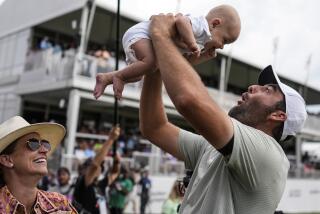Growing pains for FedEx Cup
- Share via
ATLANTA -- It’s about points, not money. That’s the core of the FedEx Cup playoff race, the PGA Tour has insisted since the $63-million, 36-tournament, NASCAR-like chase began in January.
And now, with the $7-million Tour Championship, the fourth and final FedEx Cup playoff tournament getting underway Thursday, with $35 million in bonuses at stake and $10 million going to the winner, one fact has become abundantly clear:
It’s all about the money.
The PGA Tour persuaded FedEx to invest $50 million in this first version of a professional golf points race and playoffs, and some fortunate golfer is going to become even richer by Sunday.
There are only 30 players in the field at East Lake Golf Club, but under a convoluted points system, only six of them have a chance at the $10-million bonus for winning the FedEx Cup: Tiger Woods, Steve Stricker, Phil Mickelson, Rory Sabbatini, K.J. Choi and Aaron Baddeley.
That $10 million isn’t cash, it’s an annuity, and some players didn’t think that was such a great idea.
The best advice for explaining the relevance of the FedEx Cup? Ty Votaw, the PGA Tour’s executive vice president, suggested that the players contact their accountants.
But other than the obvious financial implications, the FedEx Cup has enjoyed some other intriguing moments during its maiden voyage.
Start with the points race. Jack Nicklaus said he didn’t understand the points system and said if he couldn’t make sense of it, how could the average fan?
Some players thought the FedEx Cup concept was shoved down their throats, but Stewart Cink, a tour policy board member, said that players complaining about making millions of dollars was misguided and a turn-off to the fans.
So Tom Pernice took another tack. He questioned whether there was money being taken out of the players’ retirement fund to help cover the annuity.
Then there was the player no-show factor. Woods skipped the Barclays, the first playoff tournament, but he won the third one last week at the BMW Championship and now leads the points list.
Ernie Els skipped the second playoff and Mickelson sat out last week, after winning the week before, then went public with a dispute over the playoff setup with Commissioner Tim Finchem.
Sabbatini said he would make it a rule to play all four playoffs to be eligible to win the Cup.
There is also the condition of the bent-grass greens at East Lake. When the players showed up at East Lake, they learned that the pro-am had been canceled because the greens were in danger of being fried from hot weather and a drought. Only three greens remained off limits Tuesday, when, of course, it started raining like crazy.
So, other than that, it’s all been smooth sailing for the FedEx Cup.
It is a largely ignored fact that the playoffs might actually turn out just fine and could possibly be even better next year with a little fine-tuning . . . if anyone could figure out what to do.
The NASCAR-like points theme, in the playoff, could be a place to start.
It’s virtually unheard of that a NASCAR Nextel Cup driver such as Jeff Gordon or Tony Stewart would skip a race, either in the regular season or the 10-race playoff for the top 12 drivers, known as the Chase for the Nextel Cup.
But sitting one out didn’t hurt Woods or Mickelson.
“The points are what they are and if you’re going to take a tournament off and still have a chance to win, then you’d just better darn play well, really well,” Cink said.
“You can’t argue with a guy that takes a week off and then plays great to put himself in a position to win. I guess like Tiger is leading right now.
“Is it a flawless system? I don’t know. I think it would be a flaw to make Tiger Woods play four straight tournaments, myself.”
Cink has been outspoken in his belief that there was no break in the lines of communication between the tour and the players concerning the Cup.
He said attendance at some of the players’ meetings was “abysmal.”
Cink said there would be some changes next year, but that one thing is clear: the players need to stop complaining.
“If we embrace it and it means something to us, then the fans are going to think so and they’re going to follow it and it’s going to be big,” Cink said. “But if we complain about it and we say too many tournaments in a row or whatever, deferred payment, there’s a lot of different issues, then the fans are going to be turned off and it’s not going to be a very good television show.”
Mark Calcavecchia said every first-time venture doesn’t work perfectly. He suggested changing the points so that there’s not such a large margin between the first- and second-place players in a playoff event compared to those further down the line.
There are more changes Calcavecchia said he would recommend in what has been a much discussed, complicated, controversial experiment.
“Probably, but I can’t think of any right now,” he said. “My brain went blank.”
--
More to Read
Go beyond the scoreboard
Get the latest on L.A.'s teams in the daily Sports Report newsletter.
You may occasionally receive promotional content from the Los Angeles Times.










